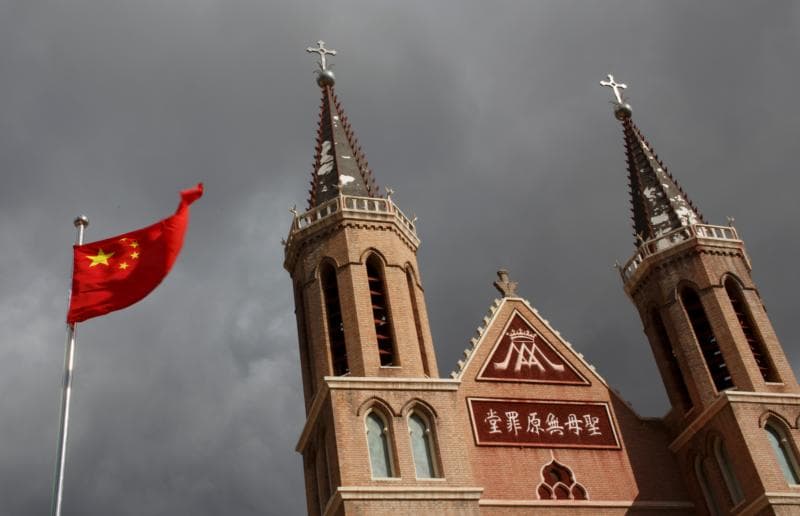In a new chapter in its relations with the Chinese government, the Vatican has issued guidelines for how bishops and priests in China can register with civil authorities while urging that “no intimidatory pressures” be put on underground Catholics in the country.
In an unsigned statement released on Friday, the Vatican said bishops in China had requested advice on how to fulfill the new requirement to civilly register with the government.
The revised Regulations on Religious Affairs announced in 2017 and implemented on February 1, 2018, require all ministers to be registered, but also makes other requirements, such as forbidding religious worship or instruction for those under 18 and greatly curtailing missionary activity.
In addition, clergy must be aligned with one of five officially recognized organizations for religion in China, which for Catholics is the Chinese Catholic Patriotic Association, a creature of the Communist government which the Vatican has always maintained is incompatible with Catholic doctrine.
This requirement has meant Catholics loyal to the pope have not been able to register in the past — China’s estimated 10-12 million Catholics have historically been almost evenly divided between members of the “patriotic” Church and the “underground” Church loyal to Rome.
Last year, the Vatican and the Chinese government signed a provisional agreement on the appointment of bishops, which included the Vatican recognizing the bishops of the state-approved Church.
In the June 28 statement, the Holy See said the “complex reality of China and the fact that there does not appear to be a uniform praxis with regard to the application of the regulations for religious affairs” make it “particularly difficult” to issue uniform instructions to clergy about civil registration.
The Vatican note makes four observations:
1) the Constitution of the People’s Republic of China formally guarantees religious freedom;
2) the Sep. 22, 2018, Provisional Agreement between the Holy See and China on the appointment of bishops recognized the particular role of the Successor of Peter, and this “logically leads the Holy See to understand and interpret the “independence” of the Catholic Church in China not in an absolute sense, namely as separation from the Pope and the Universal Church, but rather relative to the political sphere, as happens everywhere in the world in the relations between the Universal Church and the particular Churches”;
3) the context of the current relations between China and the Holy See are different than when the Chinese Catholic Patriotic Association was established in the 1950s; and
4) over the years, many bishops who were ordained without papal permission have asked for and received reconciliation with Rome, and now all Chinese bishops are in communion with the universal Catholic Church.
The note said that given these facts, a priest or bishop can register civilly, but should be careful to safeguard his conscience if the text of the declaration “does not appear respectful of the Catholic faith.”
In that case, the cleric should “specify in writing, upon signing, that he acts without failing in his duty to remain faithful to the principles of Catholic doctrine.” The Vatican document said if it is impossible to do this in writing, the cleric should make the declaration orally, and, if possible, in the presence of witnesses. It added, “it is appropriate that the applicant then certify to his proper Ordinary with what intention he has made the registration.”
“The registration, in fact, is always to be understood as having the sole aim of fostering the good of the diocesan community and its growth in the spirit of unity, as well as an evangelization commensurate to the new demands of Chinese society and the responsible management of the goods of the Church. At the same time, the Holy See understands and respects the choice of those who, in conscience, decide that they are unable to register under the current conditions,” the statement continued.
“It is important, then, that also the lay faithful not only understand the complexity of the situation, described above, but in addition accept with an open heart the anguished decision taken by their Pastors, whatever it may be,” the Vatican said.
“In any case, until such time as a modality for the civil registration of the clergy that is more respectful of Catholic doctrine, and thus of the consciences of those involved, is established through a frank and constructive dialogue between the two Parties, as agreed, the Holy See asks that no intimidatory pressures be applied to the ‘non official’ Catholic communities, as, unfortunately, has already happened,” the statement said.
The Vatican was referring to the ongoing harassment by the Chinese government against Christian communities.
According to Andrea Tornielli, the Editorial Director for the Vatican’s Dicastery for Communication, the Holy See’s latest document is “clearly based on a realistic outlook on the current situation and the persisting difficulties.”
“Reading between the lines of this latest Note of the Holy See, we can see the supreme law of the salus animarum, the salvation of souls, and the commitment to cooperating for the unity of Chinese Catholic communities, through the eyes of the Gospel, showing closeness and understanding for what the Chinese faithful have endured and continue to endure,” he said in statement.
However, Tornielli denied the Vatican was in a state of “naivety.”
The Holy See, as written in the Note, is aware of the limitations and the ‘intimidatory pressures’ faced by many Chinese Catholics, but it wants to show that we can look beyond and walk forwards without compromising the fundamental principles of ecclesiastical communion.”
According to the 2018 U.S. State Department report on International Religious Freedom, the state of religious freedom has gotten worse since the new regulations went into effect last year.
“Authorities continued to arrest Christians and enforce more limitations on their activities, including requiring Christian churches to install surveillance cameras to enable daily police monitoring, and compelling members of house churches and other Christians to sign documents renouncing their Christian faith and church membership,” the report, released June 21 said. “An ongoing campaign of church closings continued during the year, and authorities removed crosses and other Christian symbols from churches, with Henan Province a particular focus area of such activity.”
Follow Charles Collins on Twitter: @CharlesinRome
Crux is dedicated to smart, wired and independent reporting on the Vatican and worldwide Catholic Church. That kind of reporting doesn’t come cheap, and we need your support. You can help Crux by giving a small amount monthly, or with a onetime gift. Please remember, Crux is a for-profit organization, so contributions are not tax-deductible.
















